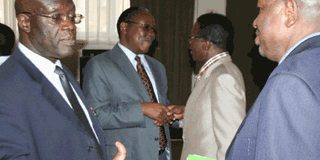Lodges fuelling new HIV cases - study

Prof Nelson Sewankambo (L) the Principal Makerere University College of Health Sciences, chats with Mr Musa Bungudu the country coordinator Unaids, during the launch of the study in Kampala yesterday. Photo by Stephen Otage.
What you need to know:
In the study conducted by Makerere University School of Public Health more than 14,350 people in 30 districts were interviewed but 69.9 per cent of these indicated that they met their sex partners in bars.
Kampala-Lodges, hotels and bars are some of the places that act as safe havens for sex contributing to the rise in new HIV infections in Uganda, according to a new study conducted by Makerere University School of Public Health.
The study – ‘Priorities for local Aids control efforts’ indicates 41 per cent of female customers and 30.8 per cent of male customers in hotels and lodges have not used condoms in the past 12 months preceding the study, which increases their chances of acquiring HIV.
“Some of the places which were found to be the biggest havens for unprotected sex were bars, lodges, churches, truck drivers and events like music concerts,” said Prof Freddie Ssengooba, an associate professor at the School of Public Health.
This, according to Prof Ssengooba, one of the lead researchers, is due to low supply of condoms even as customers of such places are willing to use them.
The study, conducted in 30 districts, which sampled more than 14,350 people, showed there was need to provide condoms in areas where unprotected sex is most likely to be practiced.
For instance, more than 69.9 per cent of people interviewed, according to the report met their new sex partners in bars.
The report also indicates that HIV prevalence is high among people who work in these areas.
People such as waitresses, waiters, bar men and women are, according to the report more exposed than others.
In Hoima District for example, 73.2 per cent of men and 70.1 per cent of women said it was easy for them to access condoms although only 63 per cent of men and 55.4 of women said they occasionally used them.




